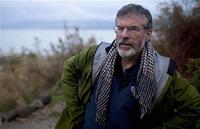-
U.S. officials say Israel softening position on nuclear deal with Iran
Israel’s official position on any agreement reached between the world powers and Iran over Iran’s nuclear program is “zero, zero, zero,” that is, Israel insists that the agreement should clearly stipulate that Iran should have no centrifuges to enrich uranium, no centrifuge production capability, and no heavy-water reactor and the means to extract weapon-grade plutonium from it. American officials say, however, that informally there has been a softening of Israel’s position, and that it now appears clear that Israel no longer regards the zero- zero, zero option as realistic and achievable.
-
-
Lawmakers urge NRC not to exempt shut-down nuclear plants from emergency, security regulations
Lawmakers are urging the U.S. Nuclear Regulatory Commission (NRC) to halt exemption of recently- shuttered nuclear power plants from emergency-planning and security regulations. The lawmakers are especially concerned about the nuclear waste which will continue to be stored on the grounds of shut-down nuclear plants, saying that the stored radioactive waste continues to be a security threat whether or not the plant itself is still operational.
-
-
Gerry Adams arrest: peace process in Northern Ireland can’t take much more pressure

The arrest last week of Sinn Féin leader Gerry Adams for questioning relating to the 1972 murder of Jean McConville threatens to undermine an established peace process in Northern Ireland, a process where the Rubicon has already been crossed, involving political sacrifice on all sides. Last December, following negotiations with all sides to the conflict, U.S. diplomat Richard Haass proposed a way to deal with outstanding issues in the peace process, a proposal which saw the past firmly on the agenda. The Adams arrest contradicts the Haass proposal, as it continues with the eclectic and incoherent approach to dealing with the open issues from a painful past. The Haass proposals may not be perfect, but experience from other countries shows that no perfect mechanism for dealing with the past exists. The key question now is not how to get to something better. It is a choice between Northern Ireland having a dedicated thought-through forum in which to contend with the past, or being forced to make do with political and legal institutions that were not designed to deal with it. The peace process has come too far, with both sides sacrifices to get this far. Its achievements should not be treated so carelessly.
-
-
Using biometrics to protect India’s one billion people raises security, privacy concerns
The cutting edge of biometric identification — using fingerprints or eye scans to confirm a person’s identity – is not at the FBI or the Department of Homeland Security. It is in India. India’s Aadhaar program, operated by the Unique Identification Authority of India (UIDAI) and created to confirm the identities of citizens who collect government benefits, has amassed fingerprint and iris data on 500 million people. It is the biggest biometric database in the world, twice as big as that of the FBI. It can verify one million identities per hour, each one taking about thirty seconds. The program unnerves some privacy advocates with its Orwellian overtones.
-
-
Governments more likely to negotiate with terrorists as violence increases: study

For decades, the hard line approach to national terrorism cases has called for governments not to negotiate with terrorists. This approach also asserted that terrorism is ineffective. A new study is proposing, however, that in certain cases the opposite may be true.“Instead of asking whether terrorism is effective, we should be concentrating on when and for what purpose is terrorism effective, especially since the empirical record shows that terrorism has both hurt and helped the causes of violent organizations that have employed the tactic,” the author writes.
-
-
Sinn Féin’s president Gerry Adams arrested over 1972 murder
Sinn Féin president Gerry Adams was arrested on Wednesday for questioning about one of the most notorious IRA murders during the Troubles. Detectives in Antrim questioned Adams about the execution of Jean McConville, a widowed mother of 10 who was dragged from her west Belfast home in 1972, tortured, and shot in the back of the head. McConville was one of the “Disappeared” – IRA victims whose bodies were buried so they would never be found — and her body was not discovered until 2003. Adams’s arrest and questioning follows a ruling by a court in the United States which compelled Boston College to hand over to the Police Service of Northern Ireland recorded interviews with veteran IRA members about McConville’s murder.
-
-
U.S. should significantly reduce incarceration rate: study
There has been an unprecedented and internationally unique rise in U.S. state and federal prison populations, from 200,000 inmates in 1973 to 1.5 million in 2009. This increase occurred because of policy decisions such as mandatory sentencing, long sentences for violent and repeat offenses, and intensified criminalization of drug-related activity. Given the minimal impact of long prison sentences on crime prevention and the negative social consequences and burdensome financial costs of U.S. incarceration rates, which have more than quadrupled in the last four decades, the United States should revise current criminal justice policies to significantly reduce imprisonment rates, says a new report from the National Research Council. The dramatic rise in prison population “not serving the country well,” the report says.
-
-
Western intelligence: Assad plans to retain residual chemical weapons capability
Israeli intelligence officials say the regime of President Bashar Assad in Syria may be concealing a small amount of the chemical weapons in its possession, while pretending that it is fully cooperating with the process to remove all chemical weapons from Syria. This assessment is similar to conclusions reached by the U.S. and U.K. intelligence communities in the past two weeks. The Israeli view is that the retention of chemicals by the Assad regime has to do with the ongoing fight against the rebels, and is not an indication that the regime is contemplating their use against Israel. A senior intelligence source also said that unlike the consensus in the intelligence community a year or two ago, the Israeli defense establishment no longer considers bringing down the regime in Damascus as necessarily positive for Israel.
-
-
DHS cancels acquisition of BioWatch’s Generation 3 technology
Owing to concerns about BioWatcheffectiveness and high cost, DHS has canceled plans to install an automated technology meant to speed the 24-hour operations of the program, the nation’s system for detecting a biological attack.ASeptember 2012 GAO report estimated that annual costs to operate the Generation 3 technology would be “about four times more” than the existing BioWatch system.
-
-
More crude oil shipments by rail mean more accidents, but security measures lag

American rail companies have long operated under federal laws, making it difficult for local officials to gather information on cargo and how rail companies select their routes. An increase in the number of trains transporting crude oil, accompanied by a series of derailments and explosions, has highlighted the dangers of transporting hazardous substances by rail.In February, the Department of Transportation announced that railroads had voluntarily agreed to apply the same routing rules to oil trains that they currently apply to other hazardous materials. Critics say more needs to be done.
-
-
U.S. approves fewer security clearances
A new report by the Office of the Director of National Intelligence(ODNI) shows that the number of new security clearances provided by the federal government, both initial clearances and renewals, has decreased by 9 percent since 2011. The number of approved clearances decreased for the second consecutive year in fiscal 2013, to just over 777,000.One observer saidthe reduction is a response to a period in the mid-2000s when “basically everyone needed a clearance.”
-
-
Terrorism can be a successful strategy, but only when governments allow it to work
Terrorism can be a successful strategy for rebel groups during civil war, but only when governments allow it to work, finds a new study. Responding to acts of terrorism with violence is more likely to prolong the conflict. If governments negotiate or use sound counterterrorism efforts, however, they stand a better chance of bringing about a peaceful resolution. The study analyzed civil conflict from 1989 to 2010 in Africa, which has seen a drastic rise in terrorism. Some forty-five of the 106 African rebel groups in the study carried out terrorist attacks.
-
-
Former DHS IG altered oversight reports, shared information
Charles Edwards, the acting DHS inspector general from 2011 through 2013, has been found to have routinely shared insider information with other department leaders, according to a new report from a the Homeland Security and Government Operations Committee published last week.
-
-
Al-Qaeda tried to turn an Oregon ranch into a training camp

U.S.-born Muslim convert Eva Hatley testified in Manhattan federal court on Tuesday, claiming that after opening her family’s Oregon ranch to local Muslims to teach them how to grow and can vegetables, the men turned her home into an al-Qaeda training camp. She said “carloads” of fellow Muslims she met through her mosque arrived at her 160-acre ranch in Bly in 1999.Hatley was testifying at the trial of Abu Hamza al-Masri.
-
-
Access of Russian surveillance craft to U.S. airspace questioned
Under the Treaty on Open Skies (OS), signed in 1992 and ratified in 2002, thirty-four nations allow the protected passage over their territory of surveillance aircraft from other OS signatory member states, aircraft featuring advanced sensory equipment that allow for the monitoring of arms controls compliance and troop movements. With rising U.S.-Russia tensions over Ukraine, and with information emerging about a new Russian surveillance aircraft model equipped with the most advanced surveillance capabilities, U.S. government officials and lawmakers question whether OS-related Russian surveillance flights over the United States should continue.
-
More headlines
The long view
What Does Netflix’s Drama “Adolescence” Tell Us About Incels and the Manosphere?
While Netflix’s psychological crime drama ‘Adolescence’ is a work of fiction, its themes offer insight into the very real and troubling rise of the incel and manosphere culture online.
A Shining Star in a Contentious Legacy: Could Marty Makary Be the Saving Grace of a Divisive Presidency?
While much of the Trump administration has sparked controversy, the FDA’s consumer-first reforms may be remembered as its brightest legacy. From AI-driven drug reviews to bans on artificial dyes, the FDA’s agenda resonates with the public in ways few Trump-era policies have.
The Center Can Hold — States’ Rights and Local Privilege in a Climate of Federal Overreach
As American institutions weather the storms of executive disruption, legal ambiguity, and polarized governance, we must reexamine what it means for “the center” to hold.
How to Reverse Nation’s Declining Birth Rate
Health experts urge policies that buoy families: lower living costs, affordable childcare, help for older parents who want more kids
Foundation for U.S. Breakthroughs Feels Shakier to Researchers
With each dollar of its grants, the National Institutes of Health —the world’s largest funder of biomedical research —generates, on average, $2.56 worth of economic activity across all 50 states. NIH grants also support more than 400,000 U.S. jobs, and have been a central force in establishing the country’s dominance in medical research. Waves of funding cuts and grant terminations under the second Trump administration are a threat to the U.S. status as driver of scientific progress, and to the nation’s economy.
The True Cost of Abandoning Science
“We now face a choice: to remain at the vanguard of scientific inquiry through sound investment, or to cede our leadership and watch others answer the big questions that have confounded humanity for millennia —and reap the rewards.”
